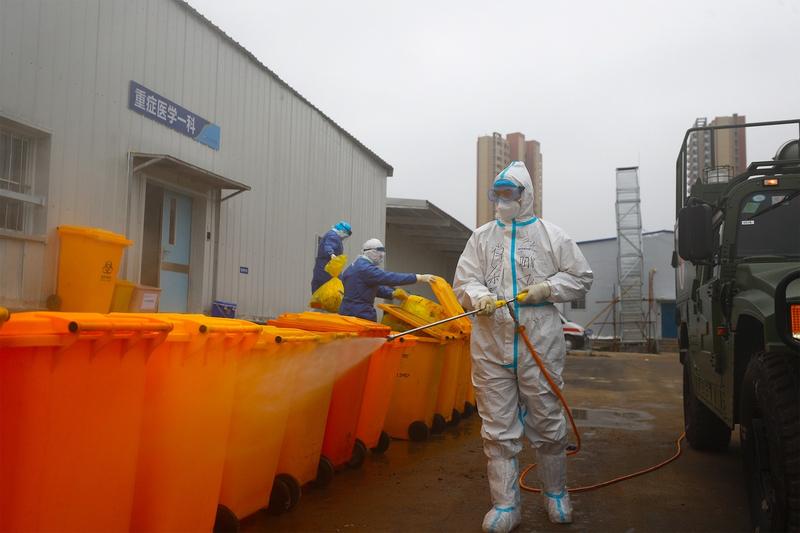 A staff worker disinfects medical waste bins in Wuhan, Central China's Hubei province, on Feb 26, 2020. (PHOTO / XINHUA)
A staff worker disinfects medical waste bins in Wuhan, Central China's Hubei province, on Feb 26, 2020. (PHOTO / XINHUA)
Public hospitals in China should strengthen their capabilities to cope with infectious diseases, such as setting up separate medical waste disposal systems and enhancing training in preventing hospital infections, to better fend off possible viral outbreaks in the future, a medical expert said on Tuesday.
Han Ding, vice-president of Peking Union Medical College Hospital, said at a news conference that the domestic COVID-19 epidemic, which is now largely contained, has exposed some weaknesses in the country's health system, especially the acute disruption of regular medical procedures when a new contagious disease hits local hospitals.
The biggest issue reflected by the current outbreak is that the normal working status of public hospitals was badly affected. It is important to integrate anti-virus measures into daily operations of medical institutions.
Han Ding, Vice-president of Peking Union Medical College Hospital, China
"The biggest issue reflected by the current outbreak is that the normal working status of public hospitals was badly affected," he said. "It is important to integrate anti-virus measures into daily operations of medical institutions.
"For instance, an independent waste disposal system can be set up in relatively isolated areas in a hospital. For more advanced hospitals, a separate infectious disease building or a P3-level research laboratory can be built."
ALSO READ: Revision seeks to improve disposal of medical waste
Han also suggested public hospitals draft detailed plans on dividing their wards into polluted zones, semi-polluted zones and clean zones. Such divisions are commonly made in institutions treating patients infected with contagious diseases.
"When a virus strikes and infectious disease hospitals are unable to handle an overflow of patients, other public hospitals with such preparations can promptly step in and help relieve the pressure," he said.
More efforts should be made to heighten precautions against hospital-acquired infections and increase medical workers' awareness of the risk of contracting viruses at their workplaces, Han added.
He said medical institutions should establish an effective triage procedure while maintaining smooth communication with local disease control authorities.
"In this way, suspicious patients can be identified at the first line of defense at the outpatient unit, and health workers can take standard response measures at the earliest opportunity, cutting off the chain of transmission," he said.
Peking Union Medical College Hospital, one of the most prestigious public hospitals in China, sent a team of 186 medical workers in four batches to assist Wuhan, the hardest-hit city, to fight the epidemic. Its medical team, tasked with treating the most severe cases whose lives often hanged by a thread.
READ MORE: Medical waste disposal brings challenges, big opportunities
Han, who also headed the medical assistance team from the hospital, said refined and science-based regulations, intimate cooperation between doctors and nurses and meticulous care devoted to each patient have played significant roles in reducing the mortality rates.
Yan Xiaowei, deputy director of the hospital's internal medicine department, added that since there is no established treatment for COVID-19, it is essential to provide individualized supportive therapies to those admitted into intensive care units.
"We held regular consultations gathering multidisciplinary experts to devise holistic treatment plans for each patient, incorporating not only the regular respiratory, circulatory and nutritional support, as well as infection control therapies, but also treatment to boost their immune systems or blood purification," Yan said.
"Over time, we saw that our approach had worked as many patients who were put on ventilators were eventually unhooked from the machines and transferred to regular wards," he added.











